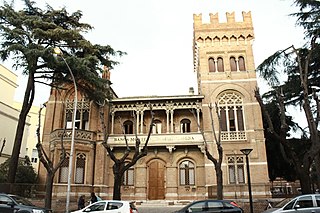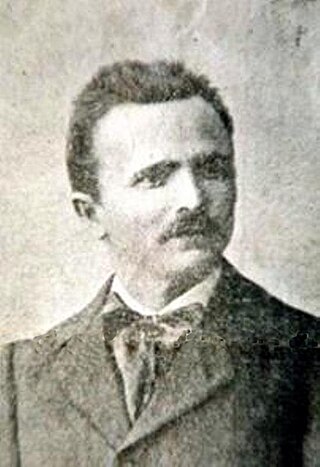
Palazzo Aldobrandeschi, or Palazzo della Provincia, is the seat of the provincial government of Grosseto, Italy, and it is located in Piazza Dante, the main square of the city. It was designed in a Gothic Revival style by architect Lorenzo Porciatti and completed in 1903. It is named after the ancient family Aldobrandeschi, since it was erroneously believed this was the location of the Aldobrandeschi's castle during the Middle Ages.

Borgo Carige is a village in Tuscany, central Italy, administratively a frazione of the comune of Capalbio, province of Grosseto. At the time of the 2001 census its population amounted to 229.

Roccamare is a village in Tuscany, central Italy, administratively a frazione of the comune of Castiglione della Pescaia, province of Grosseto. At the time of the 2001 census its population amounted to 107.

Palazzo Tognetti is an Art Nouveau building in Grosseto, Italy. It was designed by Giuseppe Luciani and completed in 1910. The building is located on Corso Carducci, the city center's main street, and is considered one of the best examples of Liberty style in southern Tuscany.

Piazza Dante is the main public square in Grosseto, Tuscany, Italy.

The Palazzo delle Poste is an administrative building which serves as the Poste Italiane headquarters in Grosseto, Tuscany. It was designed by architect Angiolo Mazzoni and completed in 1932. The building features an exterior in a monumental style, typical of the Fascist architecture, while the interior is characterized by a closer alignment with the modern principles of Italian rationalism. It also houses sculptures by Napoleone Martinuzzi and Domenico Ponzi.

Medaglia Miracolosa is a Roman Catholic church in the city of Grosseto, Tuscany. It is located outside the city walls, in the suburb of Porta Nuova, with the facade overlooking Via Roma. It is the first church in Italy dedicated to the Miraculous Medal, a Marian devotion of French origin.

San Giuseppe is a Roman Catholic church in the city of Grosseto, Tuscany. Located in the western part of the city on Via Sauro, in the Barbanella neighborhood, it is the first parish church built in Grosseto outside the historic center.

San Giuseppe Benedetto Cottolengo is a Roman Catholic church in Grosseto, Tuscany. It is dedicated to St. Joseph Benedict Cottolengo, the founder of the Little House of Divine Providence. The church is situated in the eastern part of the city's urban area, on Via Scansanese, in the Alberino neighborhood.

Santa Famiglia is a Roman Catholic church in Grosseto, Tuscany. The church, along with the entire parish complex, is located on Via Unione Sovietica in the northeastern neighborhood of Sugherella, within the "167 Nord" public housing development. The church has also attracted interest due to its unusual appearance, which evokes the look of a mosque with a minaret.

Palazzina Tempesti is a building in Grosseto, Italy. It is located on Viale Goffredo Mameli, the street leading from the historic center to the railway station, and was designed by the architect-engineer Corrado Andreini in 1913.

Villino Andreini is an Art Nouveau villa in Grosseto, Italy. It is located on Viale Goffredo Mameli, the street leading from the historic center to the railway station, and was designed by the architect-engineer Corrado Andreini in 1909 as his own personal residence.

Villino Pastorelli is a villa in Grosseto, Italy. It is located along the street which serves as the northern access route into the city walls and is the main connection between Piazza Fratelli Rosselli, in the suburb of Porta Nuova, and the historic center.

Villino Panichi is a Liberty-style villa in Grosseto, Italy. It is located on the corner between Piazza Fratelli Rosselli and Via Oriana Fallaci, just outside the historic center in the suburb of Porta Nuova.

The Palazzo del Governo is an administrative building which serves as the Italian Prefecture headquarters in Grosseto, Tuscany. It was designed in a Neoclassical style by architect Vittorio Mariani and completed in 1927. The building is situated in the suburb of Porta Nuova, outside the city walls, and is bordered by Via Roma and Viale Guglielmo Oberdan, overlooking Piazza Fratelli Rosselli, commonly known as Piazza della Vasca.

Porta Corsica is a gate located along the south-western section of the city walls of Grosseto. Its name is derived from the geographical reference point in that direction, across the sea, towards which the gate faces. It is situated along the stretch of the city wall that connects the Cavallerizza Bastion to the Molino a Vento Bastion.

Vincenzo Pasquali was an Italian sculptor, active mainly in his native Tuscany and in Liguria.

The Cinema Marraccini is a former movie theater located in the historic center of Grosseto, in Tuscany.

Barbanella is a neighbourhood in the city of Grosseto, Tuscany. The neighbourhood has approximately 17,000 inhabitants and extends over the northwestern area of the urban territory.

Sugherella is a neighbourhood in the city of Grosseto, Tuscany. The neighbourhood has approximately 18,000 inhabitants and extends over the northeastern area of the urban territory.























